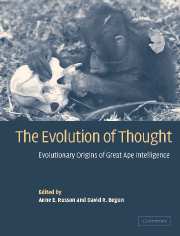Book contents
- Frontmatter
- Contents
- List of Contributors
- Preface
- 1 Evolutionary reconstructions of great ape intelligence
- 2 Enhanced cognitive capacity as a contingent fact of hominid phylogeny
- PART I COGNITION IN LIVING GREAT APES
- PART II MODERN GREAT APE ADAPTATION
- Introduction
- 7 What's in a brain? The question of a distinctive brain anatomy in great apes
- 8 Life histories and the evolution of large brain size in great apes
- 9 Evolution of complex feeding techniques in primates: is this the origin of great ape intelligence?
- 10 The special demands of great ape locomotion and posture
- 11 Great ape social systems
- 12 Diet and foraging of the great apes: ecological constraints on their social organizations and implications for their divergence
- PART III FOSSIL GREAT APE ADAPTATIONS
- Part IV INTEGRATION
- Author index
- Species index
- Subject index
Introduction
Published online by Cambridge University Press: 20 August 2009
- Frontmatter
- Contents
- List of Contributors
- Preface
- 1 Evolutionary reconstructions of great ape intelligence
- 2 Enhanced cognitive capacity as a contingent fact of hominid phylogeny
- PART I COGNITION IN LIVING GREAT APES
- PART II MODERN GREAT APE ADAPTATION
- Introduction
- 7 What's in a brain? The question of a distinctive brain anatomy in great apes
- 8 Life histories and the evolution of large brain size in great apes
- 9 Evolution of complex feeding techniques in primates: is this the origin of great ape intelligence?
- 10 The special demands of great ape locomotion and posture
- 11 Great ape social systems
- 12 Diet and foraging of the great apes: ecological constraints on their social organizations and implications for their divergence
- PART III FOSSIL GREAT APE ADAPTATIONS
- Part IV INTEGRATION
- Author index
- Species index
- Subject index
Summary
INTRODUCTION
This part explores shared adaptations and challenges acting upon living great apes in the wild that may be linked to their capacities and needs for high-level cognition. Its well-known premise is that their modern adaptations and pressures are valuable proxies for those of their common ancestor.
Efforts to assess the cognitive potential of great ape brains have turned up few distinctive features, most predictable from their large body sizes. Assessment remains hampered, however, by very small sample sizes, measurement problems, and extensive individual variability. Cognitive measures typically represent “encephalization,” for instance, in the sense of relative brain size after body size effects have been removed (e.g., EQ (encephalization quotient), neocortical index), and these are problematic as proxies for cognitive potential. These measures also show no greater encephalization in great apes than other anthropoids, which is hard to reconcile with their distinctive cognitive capacities. Features potentially more germane to cognitive capacity have been suggested, such as exceptionally large absolute size, reorganization of information processing functions, or evolution of specific structures, but have received less attention.
Large brains are linked with slow life histories–specifically, in primates, with slow maturation concentrated in slow juvenile growth. This points to brain development as a pivotal factor, although how remains unclear. Hypotheses include energetically trading off body growth to support the brain, keeping energy needs low to improve chances of surviving to maturity, and extending time for learning foraging skills.
- Type
- Chapter
- Information
- The Evolution of ThoughtEvolutionary Origins of Great Ape Intelligence, pp. 101 - 104Publisher: Cambridge University PressPrint publication year: 2004



